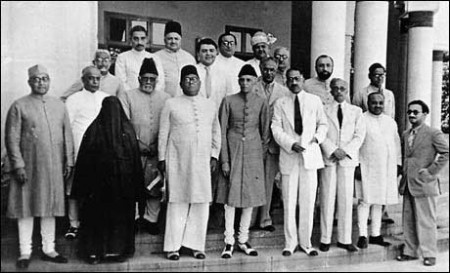The Lahore Resolution (Qarardad-e-Lahore قرارداد لاھور), commonly known as the Pakistan Resolution (قرارداد پاکستان Qarardad-e-Pakistan),was a formal political statement adopted by the Muslim League at the occasion of its three-day general session on 22–24 March 1940 that called for greater Muslim autonomy in British India. This has been largely interpreted as a demand for a separate Muslim state, Pakistan. The resolution was presented by A. K. Fazlul Huq.
Although the name “Pakistan” had been proposed by Choudhary Rahmat Ali in his Pakistan Declaration in 1933, Muhammad Ali Jinnah and other leaders had kept firm their belief in Hindu-Muslim unity. However, the volatile political climate and religious hostilities gave the idea stronger backing.
The session was held between 22 March and 24 March, 1940, at Manto Park (now Iqbal Park),Lahore. The welcome address was made by Nawab Sir Shah Nawaz Mamdot. In his speech, Jinnah recounted the contemporary situation, stressing that the problem of India was no more of an inter-communal nature, but manifestly an international. He criticised the Congress and the nationalist Muslims, and espoused the Two-Nation Theory and the reasons for the demand for separate Muslim homelands. According to Stanley Wolpert, this was the moment when Jinnah, the former ambassador of Hindu-Muslim unity, totally transformed himself into Pakistan’s great leader.
Sikandar Hayat Khan, the Chief Minister of the Punjab, drafted the original Lahore Resolution, which was placed before the Subject Committee of the All India Muslim League for discussion and amendments. The Resolution text unanimously rejected the concept of a United India on the grounds of growing inter-communal violence and recommended the creation of an independent Muslim state.
After the presentation of the annual report by Liaquat Ali Khan, the Resolution was moved in the general session by A.K. Fazlul Huq, the Chief Minister of undivided Bengal and was seconded by Choudhury Khaliquzzaman who explained his views on the causes which led to the demand of a separate state. Subsequently, Maulana Zafar Ali Khan from Punjab, Sardar Aurangzeb from the North-West Frontier Province, Sir Abdullah Haroon from Sindh, and Qazi Esa from Baluchistan, and other leaders announced their support. In the same session, Jinnah also presented a resolution to condemn the Khaksar massacre of 19 March, owing to a clash between the Khaksars and the police, that had resulted in the loss of lives.










